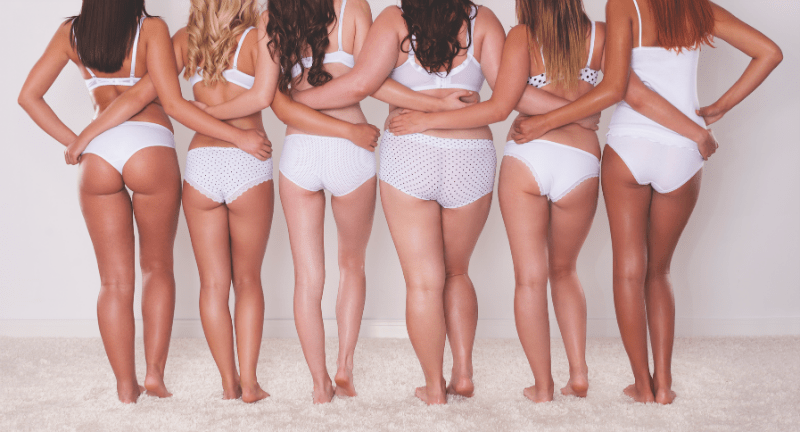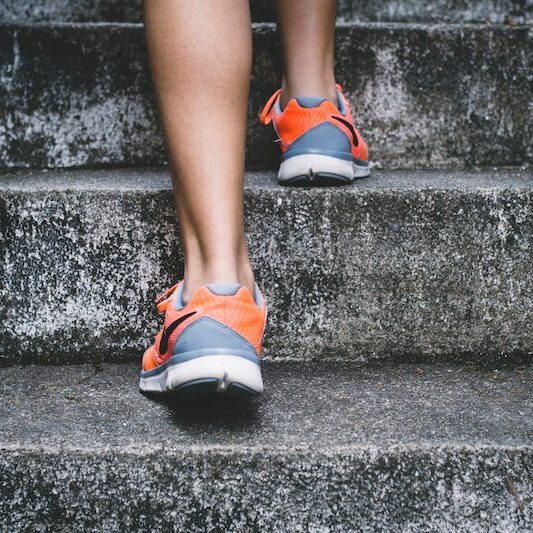 As women who love other women, it is imperative that we learn to develop a healthier body image.
As women who love other women, it is imperative that we learn to develop a healthier body image.
I met Audre Lorde when I was in my mid-20s at a party in New York City. It was a star-studded event where I was the youngest woman there, brought as the plus-one of a friend 20 years my senior.
After a sit-down dinner at Phyllis Chesler’s apartment, music was playing and some of the women started dancing. Audre Lorde pulled me, the only woman in a skirt, to my feet and we danced.
It was thrilling. I had discovered Audre’s work in college and was in awe of her. I wasn’t thinking that she and all the other women there were as old as my own mother. I was thinking that I was in the midst of feminist and lesbian greatness and that this was a moment I would likely remember forever.
Audre was wearing a loose, dashiki-style top that night, but as we danced I was suddenly aware that she had only one breast. Soon after that party, I was diagnosed with breast cancer myself, making that evening, that dance, resonate in an entirely different way.
When I was in high school, a woman whom I knew was a lesbian moved in across the street. I can’t explain how I knew, I just did. Because she had cerebral palsy, she walked with a lurching, staggering gait and her speech was garbled, but I found that all it took to understand her was to be truly listening. I was eager to learn everything I could from her, so I would sit on her porch and talk with her as she told me about her life. Eventually, I met her partner, a non-disabled butch who seemed oblivious to her girlfriend’s disability.
If we encounter imperfect bodies, either in our own community or in the larger culture, we don’t accept them. Perfection is the standard and we focus on that. In reality, very few women of any age have perfect bodies, yet that is the standard we are all expected to meet.
Audre Lorde and the woman who lived across the street from me in my childhood—call her Ms X—were way outside the norms of perfection as defined by the male-gaze culture. Audre didn’t seem to care that she had lost a breast to cancer. She was utterly assured of her own sensuality and sexiness and exuded that. Ms X didn’t abrogate her femmey-ness because she had CP, and Ms X’s butch partner showed her the same deference she would have shown any other femme.
Yet despite these early models of lesbians who loved their imperfect bodies, and were loved in return, I have always wanted my body to be different from what it was at any given time.
I am far from alone. One aspect that will never make the headlines is our historic hatred of our own bodies. Ms X and Audre Lorde were anomalies: women who seemed not to care about their physical imperfections. Perhaps each of them was grateful to be alive—Audre surviving cancer, Ms X surviving the injury to her brain that could have killed her, or left her far more physically disabled than she was. But millions of other women have never reached that level of confidence or bravado.
We are socialized to hate our bodies from an early age. We hate that we aren’t boys. We hate that we get breasts, and our periods, and that our world suddenly changes: We have to protect our bodies from outside attack—sexual harassment, sexual assault, pregnancy.
We are taught we are imperfect. We are surrounded by ads for the products necessary to make ourselves presentable. The list of products is long, from vaginal washes and sprays to erase the scent of our femaleness, to special razors to make us hairless everywhere, to make-ups and creams and depilatories to make us as pretty as society insists we should be.
Most of us accept that prescriptive list and try hard to make ourselves palatable to the (patriarchal) world. We accept that we aren’t good enough as we are. And while some men are now seeking out Botox injections, facial fillers, and plastic surgery, more than 90 per cent of the cosmetic-procedure industry is directed toward and used by women. Over 80 percent of bariatric surgeries for rapid weight loss are performed on women.
In a story arc that’s a season and a half long on ABC’s Emmy-winning drama Grey’s Anatomy, Dr Arizona Robbins (Jessica Capshaw) is injured in a small-plane crash. Her wife, Dr Callie Torres (Sara Ramirez), an orthopedic surgeon, does everything possible to save Arizona’s leg, but when sepsis sets in, the leg has to go or Arizona will die.
In seasons 9 and 10, coming to terms with her new body is extremely difficult for Arizona. She even has an affair—in part, it seems, to prove she is still attractive to someone other than Callie, who has known her since before she lost her leg.
Our hatred of our bodies is pandemic—it doesn’t require losing a body part to be at war with one’s body. The Republican-driven War on Women is localized around women’s bodies and who has control over them. In other cultures, showing any part of our bodies is against the law. Chador is mandatory. In still more places, FGM—female genital mutilation—robs us violently of our most intrinsically female parts.
We are constantly bombarded with messages that say our bodies aren’t really ours. We are told what we can and cannot do with them—so it’s not surprising that we have internalized that war against them in myriad ways. How many of us have slept with women who told us they didn’t like this or that about their bodies? How many times have we apologized for our own bodies, even if we actually thought our bodies were fine because we thought someone else would not?
The reality of our femaleness is that our bodies are in constant flux just because they are female bodies. Our hormones change our bodies at least once a month. We bloat and we bleed. We get hyper-sexual and then anti-sexual.
So too is childbirth. If we decide to have children, childbirth changes our bodies forever. Stretch marks. Saggier breasts with bigger nipples. Vaginas are no longer the tight fit they once were. Sometimes our bladders leak at the least provocation.
As we age, our bodies broaden at the base. Our bones aren’t as dense. We lose height, we gain ass and hips. Post-menopause, our skin loses its suppleness. Our vaginas get thinner and less lubricated. Our sex drive changes.
And some of us get cancer. Breast, cervical, ovarian, uterine, endometrial—those are our female cancers. But increasingly there are others, too: colon, lung, thyroid. More and more younger women—1 in 50—will get melanoma, the deadliest form of skin cancer, because of our addiction to tanning.
Some debilitating, crippling autoimmune diseases mainly impact women: multiple sclerosis (which I was diagnosed with in my early 30s), lupus, myasthenia gravis, rheumatoid arthritis.
These are the many things that can ravage us, leaving permanent scars.
But nothing ravages us as we ravage ourselves by hating our bodies. A survey by Glamour magazine in 2014 found that 97 per cent of American women have an “I hate my body” moment every day. A survey in the London Daily Mail found that 90 per cent of British women were depressed by their bodies. Psychology Today found that 80 per cent of women disliked their bodies “extremely,” and only 12 percent were satisfied with their body size. New York magazine found that 90 per cent of middle school girls hated their bodies. The Huffington Post writes that we are raising girls to hate their bodies.
In December 2014, Australian feminist activist Stella Young died suddenly at only 32. Only three feet tall, Young was born with a crippling genetic disease that kept her in a wheelchair.
Young wrote and spoke extensively about the disabled body and how disabled bodies are Othered by our perfectionist culture. In one column, she wrote about dancing in her wheelchair at a party and the ad hominem responses of the abled people around her.
Our perceptions of our own bodies limit us. Yet all our bodies will age, products and procedures notwithstanding, and aging is often quite disabling. Any one of us could lose a limb to an accident, like the TV character Arizona; or a breast to cancer, like Audre. We could be born disabled, like Stella Young or Ms X; or be felled by disability later in life, as I have been.
So what will it take to make us love the bodies we are in, to revel in them, rather than revile them? What will it take to make us stop bonding with one another over what we think is wrong with our bodies? What will it take for us to stop Othering ourselves to ourselves? My 20-something self was in awe of Audre Lorde, breast or no breast. Her age and that of the other women at that party was irrelevant to me. Did I change, or did the culture consume me?
This body hatred is one of our most hidden, most sordid histories. Our hatred, both collective and individual, of our female bodies, is one historical reality we would be far better off without.



